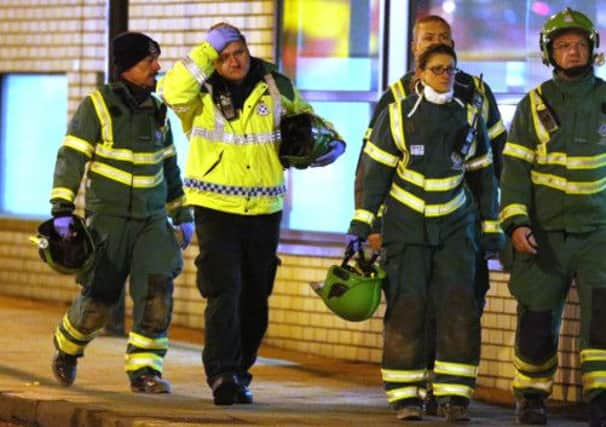Leaders: Local heroes to fore at Clutha disaster


Clutha will be remembered alongside the infamous 1960 Cheapside Street whisky bond fire in which 19 firefighters died – the worst peacetime toll suffered by the fire service in Britain. It will be mentioned in the same breath with the 1968 James Watt Street factory fire, in which 22 employees died because the windows were barred. And, of course, Clutha will join the 1971 Ibrox incident in which 66 fans were crushed to death, the UK’s worst sporting disaster before Hillsborough, in the history books. Mass deaths that come unexpectedly and unsought, in the very midst of everyday life, are especially cruel.
Yet little positives emerge from the tragedy. The death toll was so much smaller than it could have been because the lessons of the earlier disasters have been taken to heart over the years. Glasgow’s medical and emergency services moved smoothly into action within minutes of the crash, despite the police suffering casualties themselves. We should also be thankful that – though the cause of the accident remains unknown – the crash safety elements deliberately built into the downed Eurocopter EC135 particularly concerning its fuel tanks appear to have prevented a horrendous fireball that would have produced a death toll even more horrifying and unacceptable than actually occurred.
Advertisement
Hide AdAdvertisement
Hide AdAbove all, Friday’s events showed once again the resilience, community spirit and bravery of Glasgow’s ordinary citizens. There’s an old saying that a firefighter is someone who runs into a burning building when others are running out. But in Glasgow, ordinary folk were willing to risk injury and potential explosion in order to help those trapped in the Clutha Bar, while the emergency services were still on their way. We might also add a word of praise for Jim Murphy MP, who was one of the first on the scene to join the rescue efforts. And the performance of the emergency services was exemplary, their dedication and professionalism in very difficult circumstances was admirable.
It is vitally important that every resource is stretched to determine the cause of the crash and draw the appropriate safety lessons. Helicopters have been with us a long time. The Weir Group in Glasgow was the first company to design such machines in Britain. Helicopters play an absolutely indispensable role in civilian life – carrying medical patients, monitoring traffic jams, dealing with rescues at sea or on mountains.
But they are complicated pieces of machinery – more so than most fixed-wing aircraft. They operate at low altitude over built-up areas. We can’t do without helicopters – indeed it will come as a surprise that Scotland’s police had only one at their disposal. But operating helicopters entails calculated risks. After the disaster at Clutha, we need to ensure such risks are known and minimised.
Kremlin requires reminder on rights
Britain’s recent unhappy entanglements in the Middle East and Central Asia have made many wary of getting involved in the affairs of other countries without good cause. We are also used to thinking of Europe as a peaceable place where nations treat each other with respect and democracy is entrenched. But events this weekend in Ukraine suggest that democracy in Eastern Europe remains very fragile. They also show that the Kremlin is only too ready to bully its neighbours. It may be the other side of Europe, but democracy is on trial in Ukraine and that is not something Britain should ignore.
The crisis was ignited when Ukraine’s President, Viktor Yanukovych, abandoned a trade deal and freer travel with the EU, under pressure from Moscow. Neighbouring Moldova has also been bullied by the Kremlin into doing a u-turn on closer links with the EU, under threat of having its vital wine exports banned from Russia. Earlier attempts by Ukrainians to peaceably protest President Yanukovych’s decision were met by police baton charges. Over the weekend, tens of thousands of people have taken to the streets in Kiev demanding fresh elections and the impeachment of the president.
Ukraine’s democrats only want the freedoms we already take for granted in the UK. But every so often, it is necessary – even in Britain – to remember that what seems normal as human rights can easily be taken away unless we are prepared to stand up to bullies. The demonstrators in Kiev and across the Ukraine should not be left to protest alone. Britain should remind both Kiev and Moscow that Europe does not end at the Russian frontier. Nor do human rights.